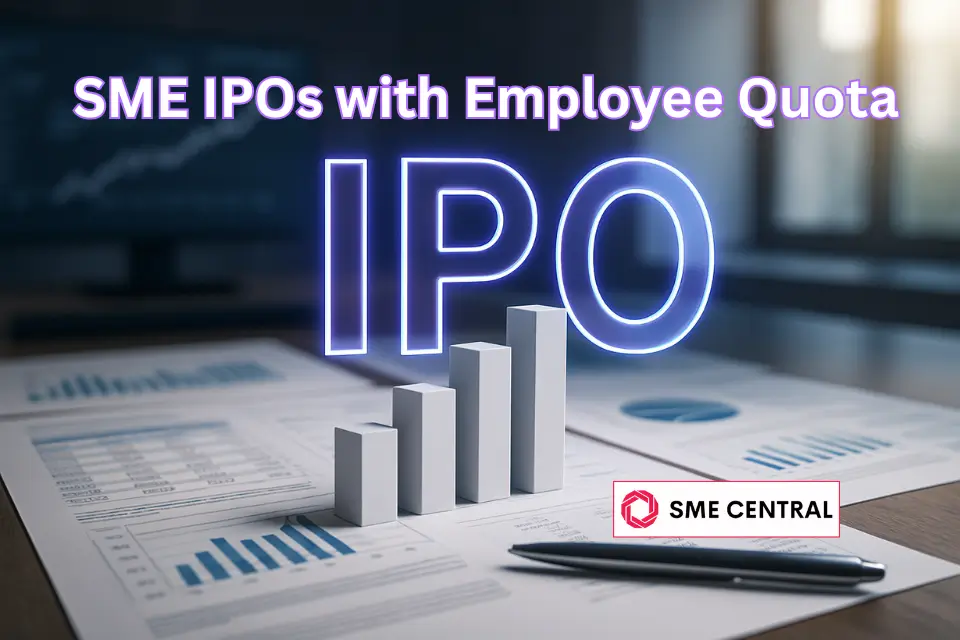Initial Public Offerings (IPOs) represent a major milestone for companies going public — allowing them to raise capital, expand market reach, and reward key stakeholders. Among the many investor categories in an IPO, the employee quota stands out as a unique feature. It provides employees with an exclusive opportunity to invest in their own organization and share in its growth.
This comprehensive guide explores the structure, benefits, and market performance of SME IPOs with employee quota — a growing trend in India’s small and medium enterprise sector.
What is Employee Quota in IPOs?
An employee quota in SME IPOs refers to a reserved portion of shares that companies allocate exclusively for their eligible employees.
Typically, there are three main categories of investors in an IPO:
- Qualified Institutional Buyers (QIBs)
- Non-Institutional Buyers (NIIs)
- Retail Individual Investors
In select cases, a fourth category is added — Employees. Under this employee quota, shares are often offered at a discounted rate, providing a financial incentive to participate.
According to SEBI regulations, the employee quota cannot exceed 5% of the company’s post-issue paid-up capital. This initiative builds employee engagement, enhances ownership, and aligns workforce interests with long-term business success.
💡 Fun Fact: Companies can offer employees a discount of up to 10% on the IPO issue price.
SME IPOs with Employee Quota
The rise of Employee Quota in SME IPOs has been one of the most promising developments in India’s capital market. Small and medium enterprises (SMEs) are increasingly recognizing the value of employee ownership and loyalty through equity participation.
By offering dedicated quotas and sometimes additional discounts, SME IPOs with employee quota encourage internal stakeholders to invest in the company’s growth story.
| IPO Name | Allotment Price (INR) | Employee Discount (INR) | Listing Price | Employee Quota Subscription (X) | Effective Returns (%) |
|---|---|---|---|---|---|
| Infinity Infoway | 155 | 309.20 | 0.77 | 99.48 | |
| Goel Construction | 263 | 10 | 317.60 | 1.01 | 25.53 |
| Current Infraprojects | 80 | 152.75 | 0.68 | 90.94 | |
| Star Imaging | 142 | 137.65 | 0.31 | -3.06 | |
| Parth Electricals | 170 | 8 | 182.70 | 0.87 | 12.78 |
| Glen Industries | 97 | 5 | 152.37 | 0.36 | 65.62 |
| Meta Infotech | 161 | 10 | 236.25 | 0.59 | 56.46 |
| Tankup Engineers | 140 | 183.75 | 0.36 | 31.25 | |
| Grand Continent Hotels | 113 | 107.25 | 1.00 | -5.09 | |
| Tejas Cargo | 168 | 168.00 | 0.73 | 0.00 | |
| PS Raj Steels | 140 | 15 | 150.60 | 1.20 | 20.48 |
| Chandan Healthcare | 159 | 173.35 | 0.21 | 9.03 | |
| BR Goyal Infrastructure | 135 | 142.50 | 1.11 | 5.56 |
Key Features of Employee Quota in SME IPOs
- Exclusive Allocation: Shares are reserved only for eligible employees.
- Discounted Pricing: Employees often enjoy lower prices than the public issue rate.
- Regulatory Cap: Limited to 5% of the post-issue paid-up capital.
- Enhanced Participation: Encourages employee involvement in company success.
- Possible Lock-in Period: Restricts immediate sale to promote long-term holding.
- Non-Transferable Benefits: The privilege is exclusive and cannot be transferred.
- Separate Bidding Process: Employees apply under a distinct category.
- Ownership Alignment: Promotes shared accountability and corporate alignment.
Advantages of Employee Quota in IPOs
- Encourages Employee Participation: Makes investing in the company more accessible.
- Boosts Morale and Engagement: Strengthens employee-company relationships.
- Wealth Creation Opportunity: Allows employees to benefit from long-term appreciation.
- Aligns Interests: Employees work toward collective growth and profitability.
- Preferential Allocation: Employees have a better chance of securing shares.
- Improves Retention: Equity ownership encourages loyalty and stability.
- Tax Benefits: Some employee investments may receive favorable tax treatment.
- Positive Brand Image: Demonstrates inclusivity and confidence in the workforce.
These benefits are particularly impactful in Employee Quota in SME IPOs, where smaller organizations can use ownership incentives to attract and retain talent effectively.
Eligibility Criteria for Employees in IPOs
- Must be a permanent, full-time employee of the company.
- Must be on active payroll during the IPO application period.
- Generally limited to Indian residents (NRIs may face restrictions).
- Must apply under the “Employee Reservation” category.
- Subject to investment caps as per SEBI and company policy.
- Benefits are non-transferable and may include a lock-in period.
- Must comply with SEBI and company-specific regulations.
Explore More Reports
- Biggest SME IPOs of All Time
- Biggest SME IPOs in 2025
- Biggest SME IPOs in 2024
- Biggest SME IPOs in 2023
- Best SME IPOs in 2025
- Best SME IPOs in 2024
- Best SME IPOs in 2023
- Highest SME IPO Subscription in 2025
- Highest SME IPO Subscription in 2024
- Best SME IPOs by Sector in 2025
- Statewise SME IPO Reports
Conclusion
Both mainboard and SME IPOs with employee quota represent a growing movement toward inclusive capitalism. By extending ownership to employees, companies not only boost morale and retention but also strengthen their corporate culture and market image.
As regulatory frameworks continue to evolve, more businesses are likely to adopt Employee Quota in SME IPOs as a strategy to align employee goals with organizational success. This approach fosters long-term value creation — benefiting employees, employers, and investors alike.

